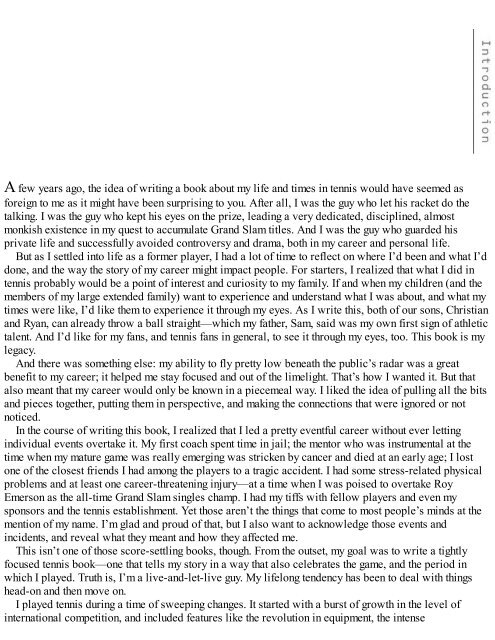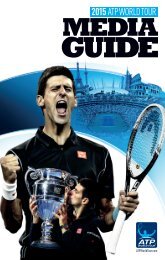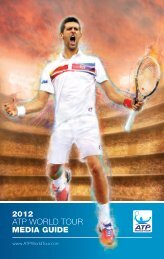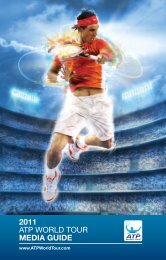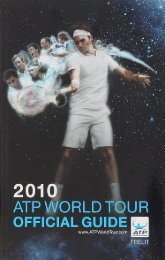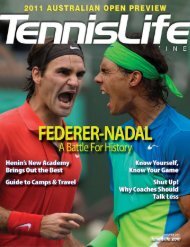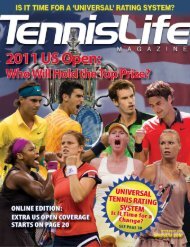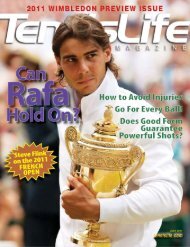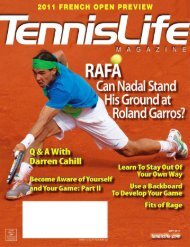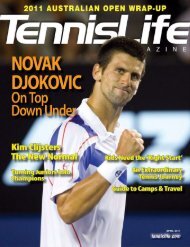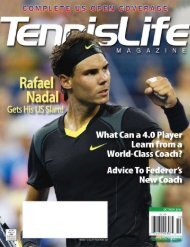A Champion's Mind - Pete Sampras
www.tennismoscow.me Insta:TENNISMOSCOW
www.tennismoscow.me Insta:TENNISMOSCOW
You also want an ePaper? Increase the reach of your titles
YUMPU automatically turns print PDFs into web optimized ePapers that Google loves.
A few years ago, the idea of writing a book about my life and times in tennis would have seemed as<br />
foreign to me as it might have been surprising to you. After all, I was the guy who let his racket do the<br />
talking. I was the guy who kept his eyes on the prize, leading a very dedicated, disciplined, almost<br />
monkish existence in my quest to accumulate Grand Slam titles. And I was the guy who guarded his<br />
private life and successfully avoided controversy and drama, both in my career and personal life.<br />
But as I settled into life as a former player, I had a lot of time to reflect on where I’d been and what I’d<br />
done, and the way the story of my career might impact people. For starters, I realized that what I did in<br />
tennis probably would be a point of interest and curiosity to my family. If and when my children (and the<br />
members of my large extended family) want to experience and understand what I was about, and what my<br />
times were like, I’d like them to experience it through my eyes. As I write this, both of our sons, Christian<br />
and Ryan, can already throw a ball straight—which my father, Sam, said was my own first sign of athletic<br />
talent. And I’d like for my fans, and tennis fans in general, to see it through my eyes, too. This book is my<br />
legacy.<br />
And there was something else: my ability to fly pretty low beneath the public’s radar was a great<br />
benefit to my career; it helped me stay focused and out of the limelight. That’s how I wanted it. But that<br />
also meant that my career would only be known in a piecemeal way. I liked the idea of pulling all the bits<br />
and pieces together, putting them in perspective, and making the connections that were ignored or not<br />
noticed.<br />
In the course of writing this book, I realized that I led a pretty eventful career without ever letting<br />
individual events overtake it. My first coach spent time in jail; the mentor who was instrumental at the<br />
time when my mature game was really emerging was stricken by cancer and died at an early age; I lost<br />
one of the closest friends I had among the players to a tragic accident. I had some stress-related physical<br />
problems and at least one career-threatening injury—at a time when I was poised to overtake Roy<br />
Emerson as the all-time Grand Slam singles champ. I had my tiffs with fellow players and even my<br />
sponsors and the tennis establishment. Yet those aren’t the things that come to most people’s minds at the<br />
mention of my name. I’m glad and proud of that, but I also want to acknowledge those events and<br />
incidents, and reveal what they meant and how they affected me.<br />
This isn’t one of those score-settling books, though. From the outset, my goal was to write a tightly<br />
focused tennis book—one that tells my story in a way that also celebrates the game, and the period in<br />
which I played. Truth is, I’m a live-and-let-live guy. My lifelong tendency has been to deal with things<br />
head-on and then move on.<br />
I played tennis during a time of sweeping changes. It started with a burst of growth in the level of<br />
international competition, and included features like the revolution in equipment, the intense


